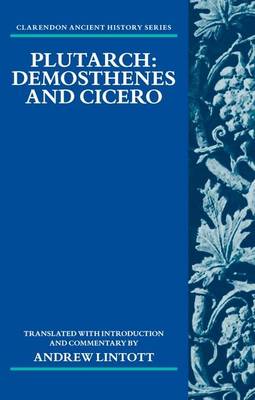
Bedankt voor het vertrouwen het afgelopen jaar! Om jou te bedanken bieden we GRATIS verzending (in België) aan op alles gedurende de hele maand januari.
- Afhalen na 1 uur in een winkel met voorraad
- In januari gratis thuislevering in België
- Ruim aanbod met 7 miljoen producten
Bedankt voor het vertrouwen het afgelopen jaar! Om jou te bedanken bieden we GRATIS verzending (in België) aan op alles gedurende de hele maand januari.
- Afhalen na 1 uur in een winkel met voorraad
- In januari gratis thuislevering in België
- Ruim aanbod met 7 miljoen producten
Zoeken
€ 87,45
+ 174 punten
Omschrijving
Plutarch's Lives have been popular reading from antiquity to the present day, combining engaging biographical detail with a strong underlying moral purpose. The Lives of Demosthenes and Cicero are an unusual pair in that they are about unmilitary men who, while superb technically as orators, were both in the end political failures, crushed by the military power which dominated their world.
In these two Lives, Plutarch is not so much interested in Demosthenes' and Cicero's rhetorical technique as in their ability to persuade an audience to vote for the right course of action, even if that action was prima facie unpopular. In Plutarch's own time, when the empire of the Caesars had been established for over a century, liberty was of necessity limited, but still an issue, for both Greeks and Romans. His home, Chaeroneia, was a provincial town in Greece, but he travelled regularly to Italy where he met Romans from the elite that ruled the empire. He wrote both for his fellow imperial subjects who still sought to enjoy what freedom they could obtain from the ruling power, and for the Romans who exercised that power but were always subject to the ultimate authority of the emperor.
Along with the translations and commentaries, Lintott provides a detailed introduction which discusses the background and context of these two Lives, essential information about the author and the periods in which these two orators lived, and the philosophy which underlies Plutarch's presentation of the two personalities.
In these two Lives, Plutarch is not so much interested in Demosthenes' and Cicero's rhetorical technique as in their ability to persuade an audience to vote for the right course of action, even if that action was prima facie unpopular. In Plutarch's own time, when the empire of the Caesars had been established for over a century, liberty was of necessity limited, but still an issue, for both Greeks and Romans. His home, Chaeroneia, was a provincial town in Greece, but he travelled regularly to Italy where he met Romans from the elite that ruled the empire. He wrote both for his fellow imperial subjects who still sought to enjoy what freedom they could obtain from the ruling power, and for the Romans who exercised that power but were always subject to the ultimate authority of the emperor.
Along with the translations and commentaries, Lintott provides a detailed introduction which discusses the background and context of these two Lives, essential information about the author and the periods in which these two orators lived, and the philosophy which underlies Plutarch's presentation of the two personalities.
Specificaties
Betrokkenen
- Auteur(s):
- Vertaler(s):
- Uitgeverij:
Inhoud
- Aantal bladzijden:
- 238
- Taal:
- Engels
- Reeks:
Eigenschappen
- Productcode (EAN):
- 9780199699728
- Verschijningsdatum:
- 5/05/2013
- Uitvoering:
- Paperback
- Formaat:
- Trade paperback (VS)
- Afmetingen:
- 137 mm x 213 mm
- Gewicht:
- 294 g

Alleen bij Standaard Boekhandel
+ 174 punten op je klantenkaart van Standaard Boekhandel
Beoordelingen
We publiceren alleen reviews die voldoen aan de voorwaarden voor reviews. Bekijk onze voorwaarden voor reviews.









